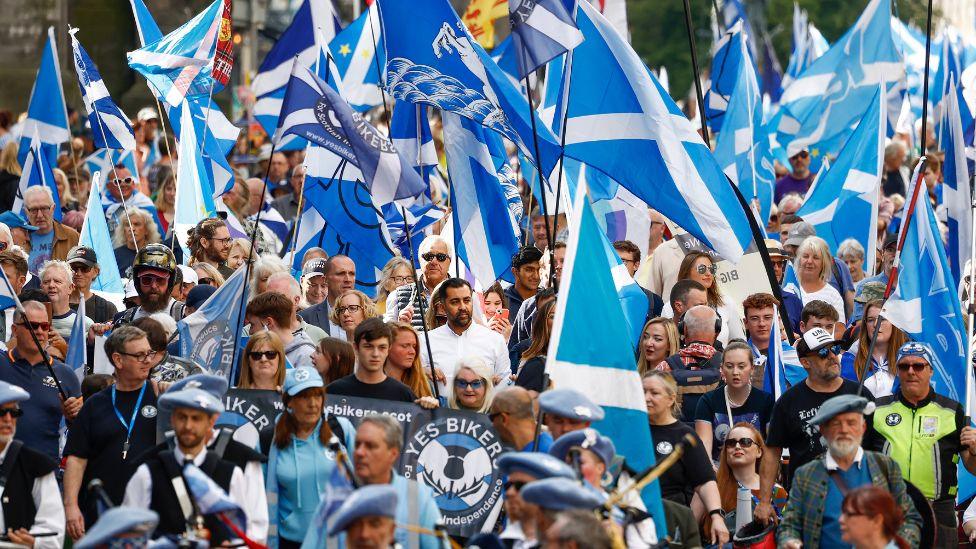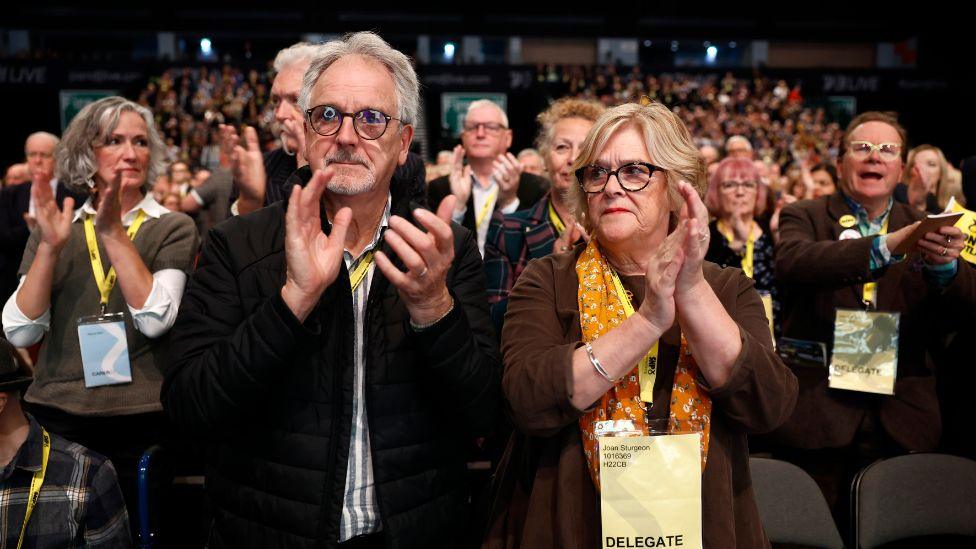Humza Yousaf sets out Scottish independence plan
- Published

Humza Yousaf will seek independence negotiations with the UK government if his party wins the most seats in Scotland at the next general election.
He has put his name to a motion backing that strategy which will be voted on at the party's conference in October.
It proposes making the first line of the manifesto "Vote SNP for Scotland to become an independent country".
Downing Street has consistently refused to countenance a referendum or negotiations on independence.
SNP Westminster leader Stephen Flynn has also signed the motion to be put to SNP members.
The text states that if the party wins the most seats, the Scottish government will be "empowered to begin immediate negotiations with the UK government to give democratic effect to Scotland becoming an independent country".
To prepare for independence, it is proposed detailed conditions of negotiations are published, including draft legal text on the transfer of powers from Westminster to Holyrood.
Work would also be carried out on a draft interim constitution and on plans to rejoin the EU.
The paper states that the SNP manifesto "should state on page one, line one, the following simple and powerful statement: Vote SNP for Scotland to become an independent country".
The next general election is expected to be held next year.

SNP members will be asked to approve the plans
Mr Yousaf's plan has been criticised by Alba Party leader Alex Salmond. The former first minister and SNP leader said: "No-one seriously believes that proposing a majority of seats as an independence mandate is at all credible.
"Given that Westminster have been allowed over repeated elections to dismiss a majority of SNP seats as a mandate for a mere referendum, why on earth would they concede it as a mandate for negotiating independence itself?
"And the leadership motion is tellingly and devastatingly silent on what democratic mechanisms should be used to bend Westminster to the will of the people."
He said votes for all independence parties should count towards a mandate for negotiations, calling for such groups to work "in harmony".
Donald Cameron, constitution spokesman for the Scottish Conservatives, said: "Humza Yousaf has made it crystal clear. He's hellbent on pushing forward an even more extreme version of Nicola Sturgeon's deeply unpopular de facto referendum plan.
"People vote on a whole host of issues at general elections, rather than just on what Humza Yousaf wants them to."
Scottish Liberal Democrat leader Alex Cole-Hamilton said: "It seems like Humza Yousaf and Stephen Flynn have lost the plot.
"They had a gold standard referendum and lost it but now they want to invent a crackpot alternative that allows them to lose a bunch of seats but still break up the UK with a fraction of the vote."
A UK Government spokesperson said this is "not the time" to be discussing "distracting constitutional change."
The spokesperson said: "People in Scotland want both their governments to be concentrating on the issues that matter most to them, like growing our economy, halving inflation and improving public services.
"We want to work constructively with the Scottish government to tackle our shared challenges because that is what families and businesses in Scotland expect."


If this sounds like the SNP is going ahead with Nicola Sturgeon's proposal to use the UK general election as a substitute referendum on independence, it is not.
Her plan was that if the SNP (or potentially a collection of independence supporting parties) was to secure a majority of votes in Scotland, that would be considered as a mandate for Scotland to leave the UK.
Humza Yousaf's proposal is different. He is arguing that if the SNP wins the most seats in Scotland that would be enough to trigger negotiations between the Scottish and UK governments "to give democratic effect to Scotland becoming an independent country".
It is understood the phrase "democratic effect" could encompass a range of possibilities including asking for another referendum or the transfer of powers to Holyrood so that MSPs could decide if and when a second referendum happens.
There is no guarantee that the next UK government would be willing to engage in such a conversation, especially if the SNP was to finish with fewer Westminster seats than they currently have.
Both the Conservatives and Labour insist that they will continue to stand against independence.

Last year, the Supreme Court ruled the Scottish government cannot hold a referendum without UK government consent.
But Mr Yousaf has said the SNP were elected on a mandate to deliver a referendum.
The Scottish government has published a series of papers in a prospectus for an independent Scotland.
Scottish Secretary Alister Jack has accused ministers at Holyrood of putting their "obsession with independence ahead of pressing priorities in Scotland".